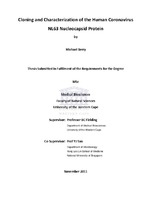| dc.contributor.advisor | Tan, Y.J. | |
| dc.contributor.author | Berry, Michael | |
| dc.contributor.other | Dept. of Medical BioSciences | |
| dc.date.accessioned | 2014-03-06T08:21:08Z | |
| dc.date.available | 2013/04/10 | |
| dc.date.available | 2013/04/10 10:41 | |
| dc.date.available | 2014-03-06T08:21:08Z | |
| dc.date.issued | 2011 | |
| dc.identifier.uri | http://hdl.handle.net/11394/2905 | |
| dc.description | Magister Scientiae (Medical Bioscience) - MSc(MBS) | en_US |
| dc.description.abstract | The human coronavirus NL63 was discovered in 2004 by a team of researchers in Amsterdam. Since its discovery it has been shown to have worldwide spread and affects mainly children, aged 0-5 years old, the immunocompromised and the elderly. Infection with HCoV-NL63 commonly results in mild upper respiratory tract infections and presents as the common cold, with symptoms including fever, cough, sore throat and rhinorrhoea. Lower respiratory tract findings are less common but may develop into more serious complications including bronchiolitis, pneumonia and croup. The primary function of the HCoV-NL63 nucleocapsid (N) protein is the formation of theprotective ribonucleocapsid core. For this particle to assemble, the N-protein undergoes N-N dimerization and then interacts with viral RNA. Besides the primary structural role of the Nprotein, it is also understood to be involved in viral RNA transcription, translation and replication, including several other physiological functions. The N-protein is also highly antigenic and elicits a strong immune response in infected patients. For this reason the N-protein may serve as a target for the development of diagnostic assays. We have used bioinformatic analysis to analyze the HCoV-NL63 N-protein and compared it to coronavirus N-homologues. This bioinformatic analysis provided the data to generate recombinant clones for expression in a bacterial system. We constructed recombinant clones of the N-protein of SARS-CoV and HCoV-NL63 and synthesized truncated clones corresponding to the N- and C-terminal of the HCoV-NL63 N-protein. These heterologously expressed proteins will serve the basis for several post-expression studies including characterizing the immunogenic epitope of the N-protein as well identifying any antibody crossreactivity between coronavirus species. | en_US |
| dc.language.iso | en | en_US |
| dc.publisher | University of the Western Cape | en_US |
| dc.subject | Human coronavirus NL63 | en_US |
| dc.subject | Nucleocapsid protein | en_US |
| dc.subject | Severe acute respiratory syndrome coronavirus | en_US |
| dc.subject | Bioinformatic analysis | en_US |
| dc.subject | Disordered regions | en_US |
| dc.subject | Cloning and bacterial expression | en_US |
| dc.subject | Antigenic epitopes | en_US |
| dc.subject | Antibody cross-reactivity | en_US |
| dc.title | Cloning and characterization of the human coronavirus NL63 nucleocapsid protein | en_US |
| dc.rights.holder | Copyright: University of the Western Cape | en_US |
| dc.description.country | South Africa | |

